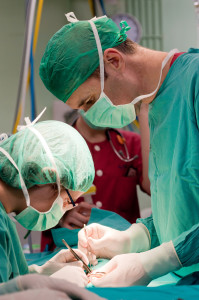 Patients with Pulmonary Fibrosis are not immune from other medical problems and we are often faced with the possibility of our patients requiring invasive care for non-lung problems. Minimizing risk requires careful communication between all involved parties.
Patients with Pulmonary Fibrosis are not immune from other medical problems and we are often faced with the possibility of our patients requiring invasive care for non-lung problems. Minimizing risk requires careful communication between all involved parties.
In order to provide the best advice to my patients I ask a series of questions designed to help understand the risk-benefit relationship.
Key questions to ask before any procedure
1. How severe is the IPF?
2. What is the nature of the proposed invasive procedure?
a. Is it elective?
b. Is it urgent or emergent?
3. What non-lung medical problems exist?
4. Who will be performing the procedure?
5. What type of sedation/anesthesia will be used?
6. Where will the procedure take place?
How Severe is the IPF?
Patients with very severe IPF should not undergo any invasive procedures unless the alternative is dire. For example, patients with severe IPF should not undergo routine screening colonoscopy. Hernias that are annoying but not life-threatening should be left alone. Urologic procedures requiring general anesthesia should not be undertaken.
Patients with mild IPF in general are at acceptable risk to undergo significant surgical procedures such as joint replacement or hernia repair. This is not to say that you should go on a shopping spree looking for surgeries, but if you are in need of invasive procedures the added risk from your lung disease is real but small.
What is the nature of the proposed procedure?
Some procedures are truly minor. Cataract surgery is the best example. This procedure takes a few minutes and is done under local anesthesia with a small amount of conscious sedation. The vast majority of patients are candidates for this. I allow all but my very sickest patients to proceed with this procedure.
There is a difference between an elective colonoscopy for cancer screening and an urgent colonoscopy for bleeding. Abdominal and chest surgeries result in greater impact on your breathing than does a surgery on your extremities. Laparoscopy (use of a camera and small incisions) is easier on the lungs than a large open incision. Shorter surgeries are less risky than longer ones.
For patients with emergent life-threatening surgical problems, we generally acknowledge the risk of the procedure and then quickly assemble the most skilled team possible and jump. For patients with very advanced disease already on hospice or on the verge of hospice we would generally advise against major surgery and focus on symptom management and move down a hospice path.
What type of non-lung medical problems exist?
Non-pulmonary medical problems can have a large impact on peri-operative risk. This is especially true for patients with coronary artery disease, heart failure or advanced liver disease. These medical problems can dramatically increase risk for death and poor outcomes after invasive procedures. When other major medical problems exist, it is important to involve other specialists to help evaluate and minimize procedural risk.
What type of sedation/anesthesia will be used?
Some invasive procedures can be done without any sedation. These procedures are performed with local anesthesia (numbing medicines at the site) or with regional anesthesia (use of nerve blocks). This is always preferable when it can be done safely. For example, surgical repair of a hand injury can almost always be done with local and regional anesthesia and does not require sedation. Another option for abdominal and extremity surgeries is spinal anesthesia. This involves injecting medicines around your spinal cord to temporarily remove sensation. This is a great option for hip and knee replacement surgeries.
Where will the procedure take place?
Some procedures may be performed in stand-alone surgical or endoscopy centers. These types of centers are best suited for otherwise healthy patients. For example, if you are turning 50 years old and need your screening colonoscopy, most take place in outpatient endoscopy centers. However, if you have advanced heart or lung disease, these centers do not have the full range of capabilities to deal with emergencies during your procedure. For patients with very mild IPF, they may have their procedures done at outpatient centers or in hospital facilities. However, patients with more advanced lung disease should not have procedures done in non-hospital based surgical or endoscopy centers.